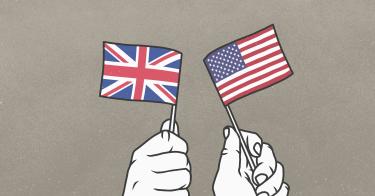“[T]he United States should strengthen its close and mutually beneficial trading and economic partnership with the United Kingdom.”
That’s the unequivocal statement from Sen. Mike Lee, R-Utah, in his recent resolution calling for a free trade agreement between the two long-time, like-minded, and willing transatlantic allies.
Advocating for a U.S.-U.K. trade agreement since Britain’s vote to exit the European Union, which allows for such a deal, Lee has introduced various versions of the resolution over the course of the past three years. Making a strong case for real and practical partnership, Lee also penned a Wall Street Journal op-ed with U.K.’s Right Honorable Iain Duncan Smith, a distinguished member of British Parliament. The joint commentary underscored,
[F]ree trade increases prosperity at home and abroad. It brings efficiency, innovation and better products at lower costs. Between nations with similar worker protection regimes, developed economies, robust legal systems and a common language—such as the U.S. and U.K.—the usual qualms over fair compensation and intellectual property protections disappear. The figures all show that global free trade has done more to reduce poverty around the world than have other measures, including government-led initiatives … [F]riends are invaluable in a pinch.
Indeed, a critical ingredient of economic freedom, free trade has been an integral part of America’s and Britain’s extraordinary economic progress over the past decades. Particularly in the context of the current global economic environment, defending and advancing trade freedom has become more critical.
Ensuring greater freedom to trade, whether bilaterally, regionally, or multilaterally, has proven one of the best ways to promote sustained economic prosperity. It is notable that rather than standing still, post-Brexit Britain—which has been securing groundbreaking, innovative trade deals—has proactively decided to move ahead on its own.
From an effectively pragmatic foreign policy perspective, it is regrettable that the Biden administration has not been working with Britain more vigorously and strategically to accelerate the trans-Atlantic economic cooperation. Washington has chosen to deprioritize and potentially derail a unique opportunity to pursue an economic freedom partnership with London in the Brexit era, by effectively slowing down negotiations for a bilateral free trade agreement.
Trade negotiations between Washington and London were formally launched in May 2020 and have proceeded apace through five rounds. The most recent came in late October 2020. However, the Biden administration’s notable unwillingness to expedite U.S.-U.K. free trade agreement negotiations and its divergent trade policy priorities have all resulted in dimming the prospects for a U.S.-U.K. free trade agreement enactment in the near term.
During his first White House summit with U.K. Prime Minister Boris Johnson in September last year, President Joe Biden poured cold water on the prospect of resuming negotiations for a free trade agreement with the United Kingdom.
Speaking to reporters in the Oval Office before the talks, Biden said, “We’re going to talk a little bit about trade today, and we’re going to have to work that through.”
In light of such apparent reluctance, many in Congress have urged the administration to resume the trade agreement negotiations with the U.K., with the latest push coming from Lee, whose above-mentioned resolution passed the Senate on May 25.
On the passage of the resolution, Lee highlighted,
The United States and the United Kingdom are the closest of allies and the most natural of economic partners. Since the British people have reclaimed the right to negotiate their own trade agreements, I have advocated for a robust trade agreement between our nations … Free trade between our nations would be good for Britons, for Americans, and particularly for Utahns who have such close economic ties to our friends across the pond.
That spirit deserves to be a forward-leaning, pragmatic trade-policy posture of the United States of America.
This piece originally appeared in The Daily Signal




